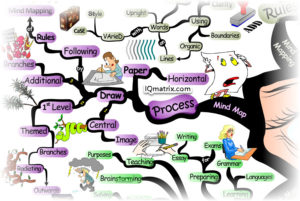We’re all guilty of it. Whether it’s jumping to conclusions, making generalizations or responding with emotion rather that sound evidence, unhealthy ways of thinking can creep up on us especially during stressful times. We’re not perfect so it’s okay as long as we can be mindful of when we’re doing this and take steps to change our thought process next time.
Below are the ten most common unhelpful thinking styles according to Adam Sicinski. Sicinski is an Australian life coach that uses mind maps and visual thinking principles. What are mind maps you ask? It’s an easy way to brainstorm thoughts organically without worrying about order and structure. It allows you to visually structure your ideas to help with analysis and recall. To the right you’ll see an example of a mind map.
 Sicinski calls his unique mind maps IQMatrix. You can learn more by clicking here, but for the purpose of this article, we are just going to dive right into those 10 unhelpful thinking styles that when used too often can harm relationships and keep you from success.
Sicinski calls his unique mind maps IQMatrix. You can learn more by clicking here, but for the purpose of this article, we are just going to dive right into those 10 unhelpful thinking styles that when used too often can harm relationships and keep you from success.
Mental Filter
Here you tend to filter things in and out of your conscious awareness. This is a form of “tunnel vision” where you only tend to focus on a part of something and you ignore the rest. You might for instance only filter out all the negatives of a particular situation. You therefore only see the negatives and fail to recognize and acknowledge the positives. Your vision of reality is therefore based on your flawed perspective of the negativity you see in each particular situation.
Jumping to Conclusions
Here you tend to jump to unjustified conclusions. You make quick assumptions about how things are and what they’re going to be like in the future (predictive thinking), or you will assume that you know what someone else is thinking (mind reading). These conclusions and assumptions are not based on fact or evidence but rather based on your feelings and personal opinions. As such, they can often lead you astray down the wrong path.
Personalization
Here you tend to blame yourself for your problems and for everything that goes wrong in your life. You might for instance continuously blame yourself for your misfortunes and bad luck. This will be true whether or not you are responsible or partly responsible for the problem or misfortune. Taking responsibility for things is admirable, however, it can end up being a very burdensome habit-of-mind that leads to very strong feelings of guilt and regret.
Black and White Thinking

Here you tend to only see the extremes of a situation. You either see one extreme or another and this is why it’s called black and white thinking. You will for instance either see the good or bad, the right or wrong, the sad or happy, the left or right, etc. And because of your extreme way of viewing things, there is never a middle-ground. As such you are unlikely to view things in an unbiased and neutral way.
Catastrophising
Here you tend to completely blow things out of proportion and make them out to be a lot worse than they should be. The reality of the situation might be quite insignificant and small. However, because you’re in the habit of catastrophizing, you always tend to make your problems larger than life — thereby making your problems even more difficult to overcome.
Overgeneralization
Here you tend to reference your past in order to make assumptions about the present. You might, for example, take one instance from the past and use that as a “predictor” or barometer for a current or future situation. Whenever you use the words “He always… She always… Everyone… You never… People never… I never…” you are at that moment overgeneralizing.
Shoulding and Musting
Here you tend to put unreasonable demands and pressure on yourself and on other people to do certain things. You tend to say, “I must… I should… You must… You should…”. These statements provide insight into the standards you tend to uphold and the things you expect of yourself and others. These standards can of course at times be helpful, however at other times “shoulding” and “musting” can create unrealistic expectations that you or others will struggle to live up to.
Labeling
Here you tend to label yourself or other people in certain ways based on behavior in very specific situations. These labels you make form your belief systems. Therefore the more times you use these labels the stronger your beliefs become. This can be a good thing, however, it’s unhelpful when you tend to label things a certain way despite the facts and evidence that are inconsistent with the labels you are making.
Magnification and Minimization
Here you tend to magnify the positives attributes of another person, while at the same time minimizing your own positive attributes. You are essentially devaluing yourself — bringing yourself down — while raising the stature of other people. In this scenario, you tend to explain-away everything you have going for yourself including your positive traits, characteristics, and achievements as though they don’t matter.
Emotional Reasoning
Here you tend to base your view of a particular situation in accordance with how you’re feeling. Therefore your feelings dictate how you perceive a situation despite evidence to the contrary. As such you might choose to feel bad about something that is going to happen just because you are feeling miserable in the moment. You are therefore using your current emotional state as a barometer that directs how you will view your life and circumstances.
Again, if you find yourself using these unhelpful thinking styles, it’s okay. The harm comes when we repeat this way of thinking and do nothing to try and change it. If we take note of, and work to change our thinking styles, we will find our work relationships, personal relationships and oveall happiness will improve greatly.










